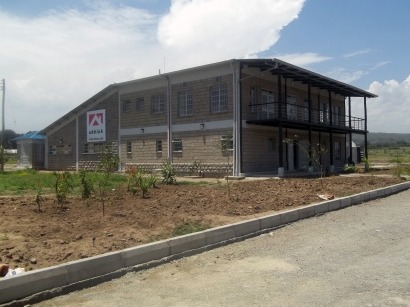
In addition to providing an opportunity to enter a growing market, the Centrotec Group sees its involvement on the African continent as an important plank of its social responsibility. Smaller complete systems such as these, which provide an off-grid, environmentally-friendly power supply – so-called “Solar Home Systems” – have great potential in Africa, and it is envisaged that the new factory in East Africa will produce solar modules mainly for small systems for private residences, village power systems or solar systems for schools, hospitals, for the water supply system and telecommunications.
Ubbink East Africa CEO Haijo Kuper is pleased with the progress being made with the new production plant: “Our solar factory – the first in the whole of East and Central Africa – is also kick starting local industry. Within the space of a year, we managed to qualify more than 30 employees for a technology that is completely new for East Africa and which is our contribution to the continent’s on-going development.”
All employees were initially trained in the Netherlands on the machines that had been ready installed there, to ensure a smooth start to production – a measure that is already paying dividends in Naivasha, says the company. Using cutting-edge European technology, the new factory is producing more than 100 high quality, KEBS certified (Kenya Bureau of Standards) solar panels a day from a standing start.
Ubbink East Africa Ltd. is part of the Joint Venture between the Dutch company Ubbink B.V. and Chloride Exide, East Africa’s largest supplier of batteries and solar technology. The Dutch government’s fund for renewable energies in underdeveloped countries contributed more than the half of the investment cost of building the solar factory in Kenya as an exemplary, sustainable, socially responsible investment project.
The Centrotec-Group wants the project to promote sustainable economic growth as well as the environmentally-friendly electrification of Africa. Only a very small percentage of the sun-drenched continent is connected to the power supply, so that decentralised power generation systems make sense. The rural population in particular is excluded from economic progress by the lack of access to electricity. The lack of power hampers participation in educational opportunities, which would be an enormously important route out of poverty, medical care and economic activity of almost every description.
Almost the only energy sources are noxious paraffin lamps or diesel generators, which are becoming very expensive to run because of maintenance and rising oil prices. “As a socially responsible and aware Group, we see our involvement on the African continent as an obligation of our social role of using our ‘European Engineering Made in Africa’ solar modules to create climate friendly, local power generation solutions and contribute to a sustainable development of the region,” says Gert-Jan Huisman, CEO of Centrotec Sustainable AG.
For additional information:

